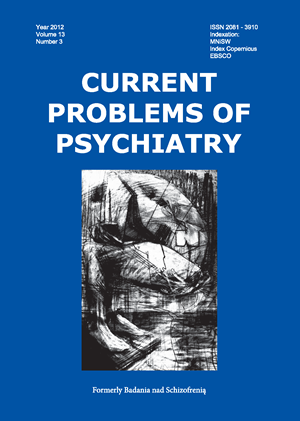Jakość życia a percepcja czasu u osób chorych na schizofrenię
Słowa kluczowe:
jakość życia, percepcja czasu, schizofrenia, AION-2000Abstrakt
Cel. Przedmiotem badań było zbadanie związków pomiędzy jakością życia (rodzinnego, społecznego, zawodowego), a percepcją czasu u osób chorych na schizofrenię (N=30). Badania mają również na celu podniesienie jakości życia osób chorych.
Metoda. W badaniach posłużono się Skalą Orientacji Temporalnej AION-2000 autorstwa C.S. Nosala i B. Bajcar (2004), oraz ankietą socjodemograficzną, która zawierała trzy pytania o jakość życia rodzinnego, społecznego i zawodowego. Osoby badane udzielały odpowiedzi na 5-cio stopniowej skali Likerta (1 - bardzo zła, 5 - bardzo dobra).
Wyniki. Badania wykazały istotne związki pomiędzy wymiarami orientacji temporalnych i osobistych koncepcji czasu, a jakością życia rodzinnego, społecznego i zawodowego. Najważniejsze wnioski dotyczą spadku jakości życia rodzinnego wraz ze wzrostem poczucia, że czas jest destruktywny, oraz wzrostu jakości życia społecznego i rodzinnego wraz ze skoncentrowaniem na teraźniejszość i przyszłość.
Wnioski. Istnieje zależność pomiędzy sposobem percepcji czasu, a poziomem jakości życia u osób chorych na schizofrenię, koncentracja na destruktywnym działaniu czasu i skupienie na przeszłości, obniża ogólną jakość życia osoby.
Bibliografia
1. Galuppi A., Turola M. C., Nanni M., G., Mazzoni P., Grassi L. (2001). Schizophrenia and quality of life: how important are symptoms and functioning? International Journal of Mental Health System. 8 (4), 31.
2. Jarema M., Konieczyńska Z., Główczak M. (1995). Próba analizy subiektywnej oceny jakości życia pacjentów z rozpoznaniem schizofrenii lub depresji. Psychiatria Polska. 29 (17), 641-655.
3. Kępiński A. (1972). Schizofrenia. Warszawa: Państwowy Zakład Wydawnictw Lekarskich.
4. Majkowicz M., Zdun-Ryżewska A. (2009). Ocena jakości życia w zaburzeniach psychicznych – koncepcje, badania, narzędzia pomiaru. Via Medica, 2 (2), 100-114.
5. Makara-Studzińska M., Wołyniak M., Gerhant A. (2009). Wpływ zmiennych klinicznych na jakość życia pacjentów chorych na schizofrenię. Badania nad schizofrenią, 10 (10), 185-193.
6. Nosal C., Bajcar B. (2004). Czas psychologiczny: wymiary, struktura, konsekwencje. Warszawa: Instytut Psychologii PAN.
7. Obrębska M., Nowak A. (2010). Perspektywa czasowa w schizofrenii. Doniesienie z badań. Current Problems of Psychiatry, 11 (4), 323-327.
8. Steuden S., Okła W. (2006). Jakość życia w chorobie. Lublin: Wydawnictwo KUL
9. Stevens M., Crow T.J., Bowman M. J., Coles E.C. (1978). Age disorientation in schizophrenia: A constant prevalence of 25 per cent in chronic mental hospital population. British Journal of Psychiatry, (133), 130-136.


